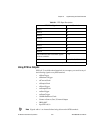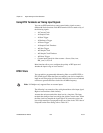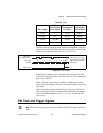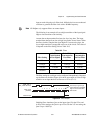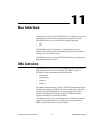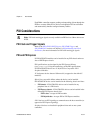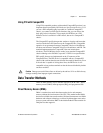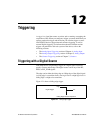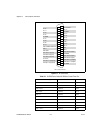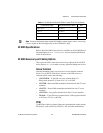
Chapter 11 Bus Interface
© National Instruments Corporation 11-3 NI 6238/6239 User Manual
Using PXI with CompactPCI
Using PXI-compatible products with standard CompactPCI products is an
important feature provided by PXI Hardware Specification Revision 2.1. If
you use a PXI-compatible plug-in module in a standard CompactPCI
chassis, you cannot use PXI-specific functions, but you can still use the
basic plug-in device functions. For example, the RTSI bus on a PXI
M Series device is available in a PXI chassis, but not in a CompactPCI
chassis.
The CompactPCI specification permits vendors to develop sub-buses that
coexist with the basic PCI interface on the CompactPCI bus. Compatible
operation is not guaranteed between CompactPCI devices with different
sub-buses nor between CompactPCI devices with sub-buses and PXI. The
standard implementation for CompactPCI does not include these
sub-buses. The PXI M Series device works in any standard CompactPCI
chassis adhering to the PICMG CompactPCI 2.0 R3.0 core specification.
PXI-specific features are implemented on the J2 connector of the
CompactPCI bus. The PXI device is compatible with any CompactPCI
chassis with a sub-bus that does not drive the lines used by that device. Even
if the sub-bus is capable of driving these lines, the PXI device is still
compatible as long as those terminals on the sub-bus are disabled by default
and never enabled.
Caution Damage can result if these lines are driven by the sub-bus. NI is not liable for any
damage resulting from improper signal connections.
Data Transfer Methods
There are three primary ways to transfer data across the PCI bus—direct
memory access (DMA), interrupt request (IRQ), and programmed I/O.
Direct Memory Access (DMA)
DMA is a method to transfer data between the device and computer
memory without the involvement of the CPU. This method makes DMA
the fastest available data transfer method. National Instruments uses DMA
hardware and software technology to achieve high throughput rates and to
increase system utilization. DMA is the default method of data transfer for
DAQ devices that support it.



